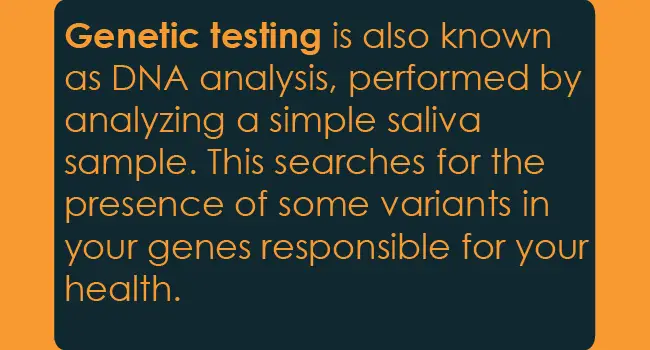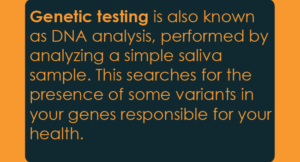
A Quick Overview On What Is Genetic Testing
What is Genetic Testing?
Genetic testing is also known as DNA analysis, performed by analyzing a simple saliva sample. This searches for the presence of some variants in your genes responsible for your health. They are mainly used to highlight mutations and heritable pathologies. It is a test to detect genetic disorders.
Enjoying or not?
I guess You said Yes. Let’s go more in detail.
Genetic testing recognizes changes in chromosomes, genes, or proteins. People have many different reasons for having these tests. For some people, it is important to know if an illness can be prevented or treated. In some cases, there is no treatment, but test results can help a person make life decisions.

How is genetic testing done?
How genetic testing is done: Several materials are used for analysis, mostly the blood, but hairpieces, saliva, skin cells, and other materials can also be used. In the case of using blood, it is taken from a vein. The sample is sent to a special laboratory, where it is further processed to isolate DNA from it.
Genetic tests can be done during pregnancy:
Genetic tests can be done during pregnancy are as follows:
- Amniocentesis: It is a test that is done between the 15th and 20th week of the pregnancy.
- Chorionic villus sampling: It is a test usually done between the 10th and 12th weeks of pregnancy.
Wanna learn more about these tests?
just go here after reading this whole article: Amniocentesis & Chorionic villus sampling.
What are the types of genetic testing?
Types of genetic testing are as follow:
- Newborn test: Tested right after birth to diagnose genetic disorders that can be treated if diagnosed promptly. These tests are routinely performed on newborns in developed countries.
- Carrier test: It allows us to identify people who are carriers of genetic modification that, if two copies are presented, would cause disease. This is usually done in people whose family history has a genetic disorder.
- Prenatal test: It is performed to identify alterations in the genes or chromosomes of the fetus before birth. This test is usually recommended for couples with a high risk of having a child with genetic alterations, but it must be taken into account that it does not identify all possible inheritable disorders.
- Diagnostic test: This test is carried out to detect variations in one or more genes to confirm or rule out a diagnosis when, based on the symptoms presented by the person, the existence of a disorder or disease is suspected.
- Forensic evidence: It is used to identify an individual for legal purposes and not to detect genetic mutations associated with the disease. It allows us to identify victims of crimes or catastrophes, implicate or exonerate suspects of criminal acts, or establish kinship relationships between people.
- Predictive and presymptomatic test: It is performed on people who do not have any symptoms of the disease at the time of carrying out the test, to determine if they are carriers of a genetic mutation that trigger the appearance of a genetic disease. It establishes whether or not the person affected by illness.
What diseases can be detected through genetic testing?
Here the list of diseases can be detected through genetic testing:
- Becker / Duchenne Muscular Dystrophy.
- African iron overload.
- homocysteine.
- Breast, ovary, and prostate cancer.
- Crohn’s disease.
- Deafness.
- Fanconi Anemia.
- Cystic fibrosis.
- Familial hypercholesterolemia.
- hereditary ataxia of Friedreich.
- fragile X chromosome syndrome.
- Hereditary hemochromatosis.
- Huntington’s disease.
- Hirschsprung’s disease.
- Lactose intolerance.
- Myotonic muscular dystrophy.
- Multiple endocrine neoplasia.
- Sickle cell anemia.
- Diversify porphyria.
- Pseudocholinesterase deficiency.
- Tay-Sachs diseases.
- Alpha-1-Antitrypsin Deficiency.
Application of genetic test:
Application of genetic test are as follows:
- Assess the severity and prognosis of the disease.
- Detect possible disease risks.
- Detecting genetic changes that may be passed on to the next zone.
- Provide doctors to choose the best treatment.
- Newborn specific disease screening.
- Identify the genetic changes corresponding to the diseases that have been diagnosed.
Benefits of genetic testing:
Through genetic testing, you can help people with potential disease risks to choose the best lifestyle and prevent diseases from happening by changing their daily schedule. They can also help people with diseases to choose their treatment; more Assist doctors to make more precise recommendations for treatment.
These messages can help people better understand health conditions and risks, to choose a suitable lifestyle and improve the quality of life.